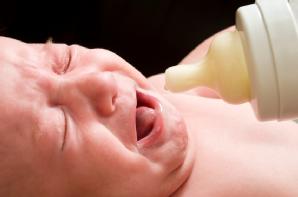Infants with persistent crying/sleeping/feeding problems more likely to have behaviour problems in childhood
 Infants who have problems with persistent crying, sleeping and/or feeding – known as regulatory problems – are far more likely to become children with significant behavioural problems, reveals research published ahead of print in the journal Archives of Disease in Childhood.
Infants who have problems with persistent crying, sleeping and/or feeding – known as regulatory problems – are far more likely to become children with significant behavioural problems, reveals research published ahead of print in the journal Archives of Disease in Childhood.
Researchers from the University of Warwick in the UK, University of Basel in Switzerland, and the University of Bochum in Germany set out to find the nature and strength of any link between regulatory problems in early infancy and childhood behavioural problems.
Around 20% of all infants show symptoms of excessive crying, sleeping difficulties and/or feeding problems in their first year of life and this can lead to disruption for families and costs for health services.
Previous research has suggested these regulatory problems can have an adverse effect on behavioural or cognitive development later in childhood, but findings have been inconclusive.
They carried out an analysis of 22 studies from 1987 to 2006 that had looked at this possible association and which had involved, collectively, 16,848 children, of which 1,935 children with regulatory problems were tested.
Of the 22 studies, 10 studies reported on consequences of excessive crying, four on sleeping problems, three on feeding problems, and five studies on multiple regulatory problems.
Childhood behavioural problems were divided into four categories – internalising (anxiety, depression or withdrawal), externalising (aggressive or destructive behaviour, conduct problems or temper tantrums), attention deficit/hyperactivity (ADHD), and general behavioural problems.
The researchers found that infants with previous regulatory problems were more likely to have behavioural problems as children than infants without regulatory problems.
The most likely outcomes for children who had regulatory problems as an infant were externalizing problems and ADHD.
The more types of regulatory problems that an infant had (cumulative problems), the more likely this was to increase the risk of behavioural problems as a child.
The researchers said that concerns about their baby’s crying, sleeping, or feeding problems were a major reason for many parents seeking professional help.
Clinically referred children often came from families with a range of risk factors such as obstetric, interactional, or psychosocial problems in addition to multiple regulatory problems.
Therefore, the accumulation of child symptoms and negative family characteristics was more predictive of behavioural problems than any particular combination of them.
The authors concluded: “Regulatory problems in infancy can increase the likelihood of developing behaviour problems in childhood.
“Our findings highlight the need for prospective follow-up studies of regulatory disturbed infants and require reliable assessments of crying, sleeping, or feeding problems.
“The evidence from this systematic review suggests that those with persisting regulatory problems in families with other problems may require early interventions to minimise or prevent the long-term consequences of infant regulatory problems.”
Click here to view the paper in full:
http://press.psprings.co.uk/adc/april/adc191312.pdf
Contacts:
Peter Dunn, Head of Communications
Communications Office, University House,
University of Warwick, Coventry, CV4 8UW, United Kingdom
email: p.j.dunn@warwick.ac.uk
Tel: +44 (0)24 76 523708 Mobile/Cell: +44 (0)7767 655860
Professor Dieter Wolke, University of Warwick, UK
Tel: +44 (0) 1789 751878 or +44 (0)24 7652 3537
Email: D.Wolke@warwick.ac.uk
Professor Silvia Schneider, University of Bochum, Germany
Tel: +49 234 322 3169
Email: silvia.schneider@rub.de
21st April 2011
